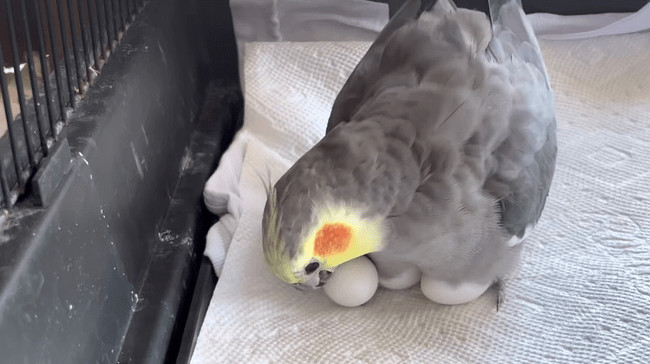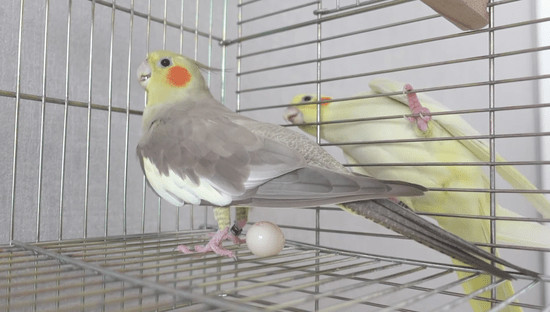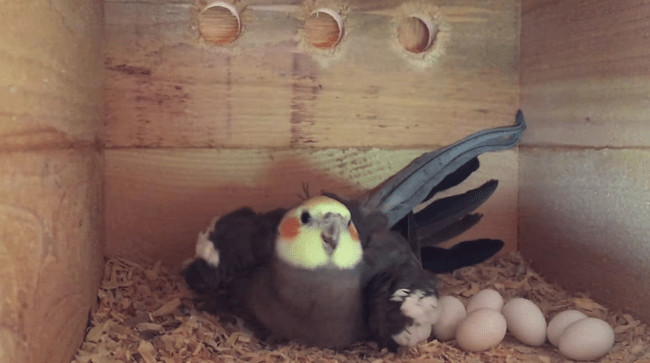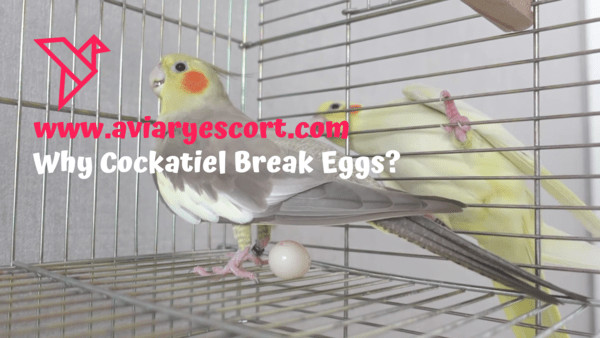Cockatiels, cherished for their vibrant personalities and affectionate nature, often exhibit intriguing behaviors, especially when it comes to egg-laying. These charming birds, known for their playful antics, can also display puzzling actions such as breaking, throwing, dropping, or even consuming their eggs.
In this comprehensive guide, we delve into the intricate world of cockatiel egg-related behaviors. From the natural nesting tendencies of these feathered companions to the reasons behind unusual egg actions, we’ll explore the various factors that influence their reproductive behaviors. Understanding these behaviors is crucial for the well-being of pet cockatiels, enabling owners to provide optimal care and a nurturing environment.
Egg Laying Cycle of Cockatiels
Cockatiels, like many avian species, have a well-defined and instinctive egg-laying process. Understanding the typical sequence of events during egg-laying can provide valuable insights into your cockatiel’s natural behaviors.
Nesting Preparation
Before laying eggs, female cockatiels exhibit nesting behaviors. They may explore their environment for suitable nesting spots, exhibiting signs of excitement and restlessness.
Egg Formation and Laying
The female cockatiel typically lays eggs every other day once she has established a nesting area. These eggs are laid without shells initially, which are formed within the reproductive tract. The whole process takes about 24-48 hours per egg.
Incubation Period
After the complete formation of the eggs, the female starts incubating them. The incubation period typically lasts around 18-21 days, during which the female remains committed to keeping the eggs warm.

Parental Care
Both male and female cockatiels share parenting duties, taking turns to incubate the eggs and eventually care for the hatchlings.
Reasons Why Cockatiels Destroy Their Eggs
While cockatiels generally follow a structured egg-laying process, several factors can contribute to deviations or abnormalities in their egg-related behaviors. Understanding these reasons is vital for addressing and preventing potential issues that may arise during the nesting and egg-laying period.
1. Infertile Eggs
Infertility in cockatiel eggs can lead to maternal instincts triggering destructive behaviors. When a female bird senses an egg won’t hatch, she may attempt to remove it to allocate energy for potentially viable eggs or due to a natural drive to maintain a clean nest
2. Protective Instincts
In certain cases, cockatiels may perceive potential threats or disturbances near the nesting area, prompting them to destroy eggs they perceive as vulnerable. This behavior aims to safeguard viable eggs from perceived danger.
3. Nutritional Deficiencies
Inadequate food and nutritional deficiencies can profoundly affect a female cockatiel’s ability to produce strong, healthy eggs. Insufficient calcium ( explained on Science Direct ) or imbalanced diets can lead to fragile eggshells, prompting the bird to exhibit behaviors such as consuming or discarding the eggs to compensate for nutritional deficits.
4. Inexperienced Pair
Inexperienced cockatiel pairs may face challenges in effectively caring for their eggs. Lack of familiarity with the nesting process might result in accidental mishandling, such as dropping or mishandling eggs due to the pair’s unfamiliarity with proper nesting behaviors.
5. Insufficient Nesting Material
Insufficient nesting material can significantly affect a female cockatiel’s ability to create a secure and comfortable nesting environment. Without adequate materials, such as nesting substrate or bedding, the bird might struggle to properly cushion and protect the eggs, leading to behaviors like discarding or breaking them.
6. Stress or Anxiety
Stress or anxiety in cockatiels can cause egg breaking and throwing out. Environmental stressors, disturbances, or anxiety-inducing factors can trigger a female bird to exhibit abnormal behaviors such as egg destruction, eating, or dropping as coping mechanisms to alleviate stress or discomfort within their surroundings.
Understanding these potential reasons behind egg destruction behaviors is crucial for owners to address any underlying issues, create a more suitable nesting environment, and minimize stress factors, ultimately promoting a more successful and comfortable breeding experience for their cockatiels.
Why Cockatiels Break Their Eggs?
Egg breakage in cockatiels can be distressing for both the bird and the owner. Several factors contribute to this issue, necessitating a closer examination of nesting habits and environmental conditions to prevent such occurrences.
a. Causes of Egg Breakage in Cockatiels
Fragile eggshells can result from nutritional deficiencies, particularly calcium. Inadequate calcium intake weakens eggshells, making them prone to breakage during handling or incubation. Furthermore, improper nesting material or inadequate nesting space can also contribute to accidental breakage.
b. Nesting Material Deficiencies and Their Impact
Cockatiels need appropriate nesting materials to build sturdy nests. Lack of suitable materials or improper nesting setups may prompt them to lay eggs in unsuitable locations, increasing the risk of breakage or mishandling.

c. Solutions to Prevent Egg Breakage
Providing a well-equipped nesting box with suitable materials like shredded paper, soft hay, or nesting fiber can significantly reduce the likelihood of egg breakage. Ensuring a balanced diet rich in calcium, alongside a stress-free environment, can strengthen eggshells and promote healthier egg-laying practices.
Why Cockatiels Throw Their Eggs?
Egg abandonment and throwing behaviors in cockatiels can be puzzling for owners. Understanding the reasons behind these actions is crucial in addressing and potentially preventing such behaviors, ensuring the well-being of both the birds and their eggs.
a. Reasons Behind Egg Throwing
Stress, disturbance, or perceived threats to the nesting area can lead to egg abandonment. Unsuitable nesting conditions, such as a lack of privacy or disturbances in the surrounding environment, might prompt the female cockatiel to abandon her eggs.
b. Factors Contributing to Egg Throwing Behavior
Cockatiels might exhibit egg-throwing behavior due to dissatisfaction with the nesting area or to protect the eggs from potential threats. This behavior can also stem from the bird’s attempt to rid the nest of infertile or damaged eggs to focus on caring for viable ones.
c. Solution to Prevent Egg Throwing
Providing a calm, secluded nesting area with minimal disturbances is crucial to prevent egg abandonment. Owners can also offer suitable nesting materials and ensure a stress-free environment to discourage egg-throwing behavior.
Why Cockatiels Eat Their Eggs?
Egg-eating behavior in cockatiels can be concerning for pet owners. This behavior, where the bird consumes its own or other eggs, can stem from various factors and understanding these reasons is essential to effectively address and prevent this behavior.
a. Reasons Behind Egg Eating
Egg-eating behavior in cockatiels can be a result of curiosity, boredom, or nutritional deficiencies. In some cases, it might be a response to stress or a way for the bird to regain nutrients lost during egg-laying.
b. Health Risks Associated with Egg Consumption
Continual egg-eating can lead to calcium deficiencies in the female cockatiel, weakening her health and potentially leading to further egg-laying issues. Additionally, it perpetuates the cycle of egg-related problems within the flock.
c. Solution for Egg Eating Behavior
Providing a balanced and nutritious diet, including ample calcium sources, can reduce the likelihood of egg-eating behavior. Ensuring an enriched environment with stimulating toys and activities can prevent boredom, reducing the bird’s inclination to consume eggs.
Health Issues Related to Egg Laying in Cockatiels
Egg laying is a natural process for female cockatiels, but it can sometimes lead to health complications that require attention and care from their owners. Understanding these potential health issues is crucial for ensuring the well-being of these birds during their reproductive cycles.
a. Egg-Binding Complications in Cockatiels
Egg-binding occurs when a female cockatiel is unable to lay an egg due to various reasons such as a large-sized egg, reproductive abnormalities, or nutritional deficiencies. This condition is serious and requires immediate veterinary intervention to prevent health risks.
b. Impact of Excessive Egg Laying on Cockatiel Health
Continuous egg-laying can deplete the bird’s calcium reserves, leading to weakened bones and other health issues. It can also cause exhaustion, leaving the bird vulnerable to infections and other complications.

c. Preventive Measures for Egg-Related Health Issues
Regular veterinary check-ups are essential for monitoring the reproductive health of female cockatiels. Providing a balanced diet with adequate calcium and ensuring a stress-free environment can help prevent potential health complications associated with excessive egg laying.
Owners should be vigilant and attentive to any signs of distress or abnormal behaviors in their cockatiels during the egg-laying period. Seeking prompt veterinary care is crucial to address and manage any potential health issues arising from the reproductive cycle, safeguarding the overall well-being of these beloved pets.
How to Stop Cockatiels From Breaking Their Eggs?
To prevent egg breaking and promote the well-being of your cockatiels, implementing specific strategies can be beneficial.
1. Safe and Healthy Environment
Creating a safe and stress-free environment is crucial. Limit disturbances near the nesting area, maintaining a calm atmosphere that supports the nesting process. Avoid sudden noises or movements that might startle or stress the birds, as this could lead to egg-breaking behavior.
2. Regular Box Inspection
Regularly inspect the nesting box for any signs of wear, tear, or discomfort. Ensure the box is appropriately sized, securely placed, and lined with suitable nesting materials like shredded paper or soft bedding. Providing a cozy and secure nesting area can deter the birds from destructive behaviors towards their eggs.
3. Consider Fake Eggs
Consider introducing fake eggs made of non-toxic materials into the nest. Cockatiels may perceive these as real eggs, deterring them from damaging their actual eggs. However, be cautious as this method may not work for all birds and situations.
4. Consider Incubation
In persistent cases of egg-breaking behavior, removing the eggs and considering artificial incubation might be necessary. Artificial incubation involves placing the eggs in an incubator to ensure proper temperature and humidity, safeguarding them from potential damage and allowing for better control over their development.
By implementing these strategies and closely monitoring the nesting process, you can reduce the likelihood of egg breaking in cockatiels and promote a safer environment for successful egg incubation and hatching.
FAQs
Q1. Can a male cockatiel exhibit egg related behaviors?
Yes, although less commonly, males may also display egg-related behaviors due to hormonal imbalances or stress.
Q2. How can I prevent egg related behaviors in my cockatiel?
Ensure a stress-free environment, provide a balanced diet, and offer a suitable nesting area to minimize such behaviors.
Q3. Are egg-related behaviors harmful to cockatiels?
These behaviors can indicate stress or health issues. It’s essential to consult a veterinarian if such behaviors persist.
Q4. Should I remove eggs if my cockatiel shows such behavior?
It’s advisable to consult an avian veterinarian for guidance. Removing eggs might exacerbate stress in some cases.
Q5. Can egg-related behaviors be a sign of a serious health issue?
Yes, persistent egg-related behaviors could signal underlying health concerns, and a veterinarian’s evaluation is recommended.



